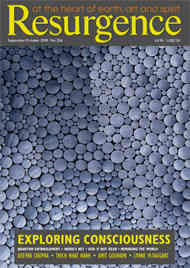In the history of ‘green writing’, the American farmer-scholar-essayist Liberty Hyde Bailey occupies a vital place, yet he remains an unfamiliar name even to those who know their Wendell Berry or Aldo Leopold (both indebted to him). Born in 1858, Bailey lived well into his nineties – long enough to see agriculture become a devastating branch of the chemical industry. Despite heading the Commission on Country Life for Teddy Roosevelt, and laying the foundations for agrarian environmentalism in numerous works – his book The Holy Earth has been called the movement’s “first manifesto” – he is largely forgotten. This collection of his writings, edited and superbly introduced by the conservationist Zachary Michael Jack, is a welcome reminder of Bailey’s prescience and power.
He covers many fields, including education and politics; an avowed Democrat and Christian, he saw the sacred in the trees and soil as well as in the sky. The key statement is to be found at the beginning of The Holy Earth: he criticises religion for being heaven- and therefore death-centred, instead of being centred on the “goodness of the Earth”. This is not because God is good, but because the Earth and its products are “good in themselves”, in the way that fish appreciate water, birds the air, and beasts their food and sleep. The planet’s bounties outweigh natural catastrophes: the Earth is both “stern” and “kindly”, and we must live in “right relationship” with it.
Bailey believes that Christianity (or Islam for that matter), with its emphasis on waiting for deliverance, has not only shadowed the Earth and its moments of quick life, but darkened it by “the common apprehension of doom”. He emphasises “obligation and service”, which includes an obligation to future generations: something all farmers, let alone the rest of us, would once have understood. He wants to see us shift our dominion from the “realm of trade” to the “realm of morals”, these last being earthed in the environment: a truly green philosophy.
Bailey is, in fact, ambiguous about trade: at times he sees it as the co-operative motor of civilisation, at others he derides it as destructive of local integrity and even of democracy – as something we should be “independent” of. In modern terms, trade is both farmers’ markets and Monsanto/McDonald’s – can we have one without the other? He is quite clear, however, on the true modern evil: “More iniquity follows the improper and greedy division of the resources and privileges of the Earth than any form of sinfulness.”
For Bailey, a tree is a “moral object”. The tension between his empathy for wilderness and his role as a leading agriculturalist is palpable, but in an essay on his father’s hoe, anticipating George Ewart Evans or John Stewart Collis, he makes it clear that good farming cannot be “measured by money”, that fieldwork is “part of the silence of Nature”. He touches on an uncomfortable contemporary issue when, in lamenting the pre-machine days of farming, already overwhelmed by labour-saving ‘innovations’, he points out that, in changing our “valuations of life”, we have bred an unaffordable “discontent”.
Since then we have also bred obesity, a natural corollary not just to junk food but to the seldom-mentioned shift from scythe to combine harvester, wagon to tractor, axe to chainsaw. Bailey’s essay on “daily fare”, if a touch puritan, is eerily prophetic: because of “adulterated” food, “we all live mechanically, from shop to table, without contact, and irreverently.”
His paean to the local apple sounds a familiar note in the wake of the EU’s cold-hearted destruction of England’s orchards (and so much else), but he also has time for the “comely” potato.
My “yes!” count in the book’s margins is high. In the essay on war, Bailey claims that “the final test of fitness in Nature is adaptation, not power”, citing the frail, delicate plants that are more ancient than mountains. Without being an anti-evolution creationist, he rejects the idea that Nature is in a state of “perpetual enmity”, a view encouraged by Nature-writing (in our day, the TV documentary) concentrating on the exotic and dramatic. There is a “yes!” outbreak in his essays on education – what we should be encouraging in the young is “Nature-sympathy”. And on the “present” (1911) rural revival, he warns against “demagogues and fakirs” taking advantage of it “for personal gain”. Green business, anyone?
The most moving part of the book, however, is the record of farmers’ letters in response to Bailey’s enquiry as to whether (in 1926) they were happy in their working life. “Only one”, he points out, “considers the money profit to be the main satisfaction in farming.” Assuming these to be authentic, they are a remarkable glimpse – a few decades off from the acrid whiff of the spray-boom or the shareholder-controlled agribusiness – of a world in which “the smell of freshly cured hay” and the simple notion of being useful to society provided equal and deep satisfaction.







